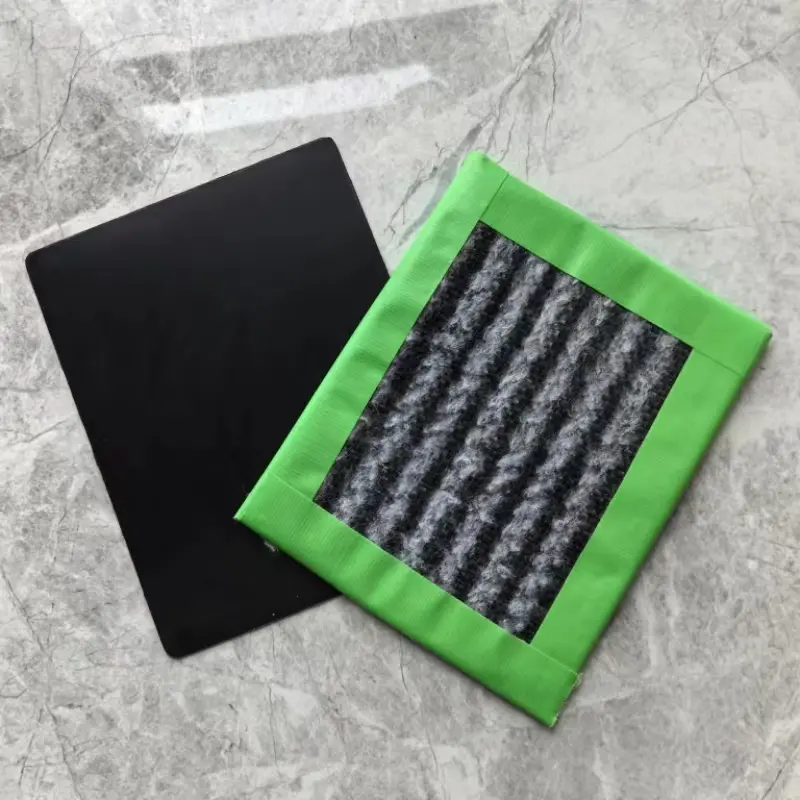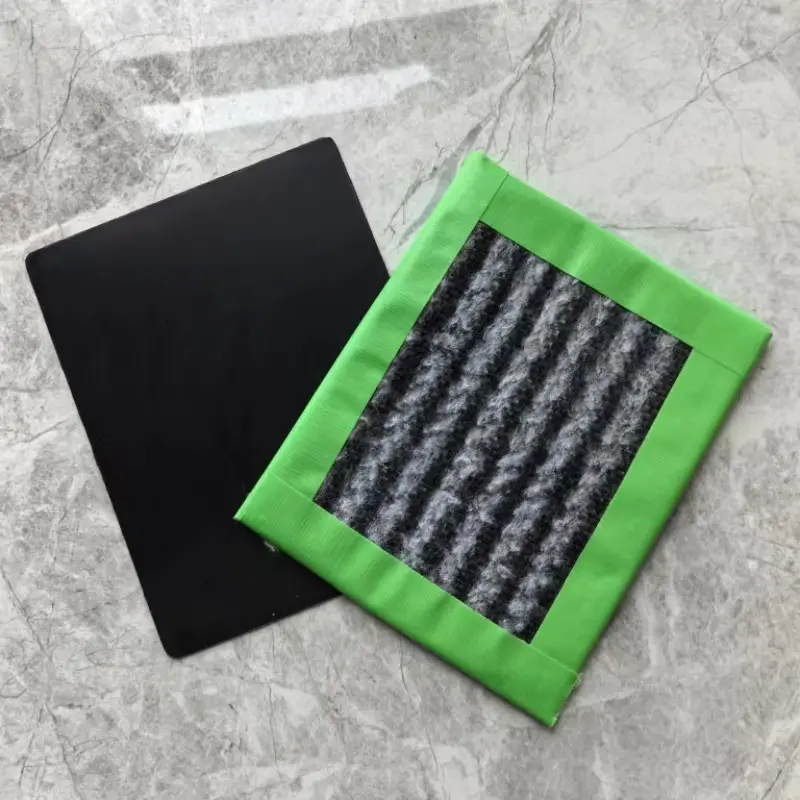Nowadays, geomembrane has been widely used in various engineering fields. Its good anti-seepage performance and excellent durability can protect groundwater resources from pollution to the maximum extent. In fact, in aquaculture fields such as fish ponds, geomembranes are also increasingly used. Compared with other materials, geomembranes have many advantages.
Advantages of Geomembrane in Fish Farming
100487.webp)
Water Retention: Geomembranes prevent water loss due to seepage, maintaining water levels and quality, which is crucial for the health and growth of fish.
Environmental Protection: By preventing seepage, geomembranes protect the surrounding soil and groundwater from contamination by fish waste and feed.
Durability: High-quality geomembranes are resistant to UV rays, chemicals, and punctures, ensuring a long service life with minimal maintenance.
Ease of Installation: Geomembranes are relatively easy to install, making them a cost-effective solution for both small and large-scale fish farms.
Types of Geomembranes for Fish Farming
HDPE (High-Density Polyethylene)
Known for its strength and durability, HDPE geomembranes are ideal for large-scale fish farms.
HDPE geomembranes have the following advantages:
1. Water storage HDPE geomembranes have good water storage performance due to their extremely low permeability coefficient, which prevents water in the fish pond from infiltrating into the soil, effectively monitors the water level, and saves related water retention costs.
2. Water quality stability Using HDPE geomembranes can better maintain the balance of water quality, reduce changes in moisture conditions, and reduce the cost and time of controlling water quality.
3. Oxygen content Using HDPE geomembranes can reduce oxygen loss caused by infiltration into the soil, facilitate monitoring of oxygen content in the water, and reduce the cost of supplementing oxygen in fish ponds.
4. Reduce maintenance costs Using HDPE geomembranes can inhibit the growth of algae in the water and are easy to clean. Since the geomembrane itself contains anti-ultraviolet additives, the geomembrane is not afraid of the sun's radiation and is easy to maintain. The use of geomembranes can provide more convenient monitoring and a safer environment. Since the maintenance cost and time are very low, fishing can be carried out more conveniently and quickly.
5. System stability
Compared with directly digging a pond, the use of HDPE geomembranes can make the slope more stable. It is conducive to eliminating the threats to the fish pond caused by natural conditions such as wind, rain, and waves, maintaining the stability of the system during design, and preventing the loss of farmed crops in the fish pond due to environmental damage. In addition, the use of HDPE geomembranes can make the pond have a steeper slope and a deeper depth, which is equivalent to increasing the output in disguise. The stability of the system, of course, also reduces the maintenance and earthwork costs of the fish pond.
6. Increase production
Because after using HDPE geomembranes, there will be no weeds, sludge, etc. on the bottom of the pond that affect the speed of fishing, so fishing can be carried out more efficiently. The fishing time will be greatly reduced, and the vitality and freshness of fish and shrimp will be greatly enhanced.
7. Disease Hazards
After using HDPE geomembrane, the environmental adaptability of bacteria in the fish pond will be greatly reduced, thus maintaining the healthy growth of fish and shrimp. Since the contact between soil and water is isolated, the chemical substances and pathogens in the soil will not spread to the pond, reducing the possibility of disease transmission. It can be said that the use of HDPE geomembrane reduces the cost of fish farming medicines and the risk of large-scale fish and shrimp deaths due to diseases.
8. Pond Cleaning
After installing HDPE geomembrane, it will be easier to clean the pond. And it is easier to install a clean drainage system in the pond.
9. Improved breeding cycle
After using HDPE geomembrane, it is easier to clean and catch, saving a lot of cost and time, and can speed up the weekly cleaning of fish ponds, which in turn increases production.
LDPE (Low-Density Polyethylene)
More flexible than HDPE, LDPE geomembranes are suitable for smaller ponds and areas requiring more flexibility.
LDPE geomembranes have the following advantages for fish farming:
Excellent Chemical Resistance: LDPE geomembranes are resistant to acids, alkalis, and salts, making them suitable for fish farming ponds where chemicals are used for water treatment and disinfection. This ensures the durability of the membranes and their ability to maintain a stable environment for fish.
Good Flexibility: LDPE geomembranes have good flexibility, which allows them to conform to uneven ground surfaces and adapt to changes in ground conditions. This flexibility ensures a reliable pond lining solution that can withstand the shifting ground conditions often found in fish farming environments.
Low Permeability: LDPE geomembranes exhibit extremely low permeability rates, effectively preventing the leakage of water from ponds. This is crucial in fish farming to maintain optimal water levels and ensure a stable environment for fish growth.
Smooth Surface: LDPE geomembranes have a smooth surface that reduces the risk of fish injuries and entanglement. This contributes to the overall health and welfare of fish in fish farming ponds.
UV Resistance: LDPE geomembranes are treated with UV inhibitors to protect them from the harmful effects of sunlight. This ensures their durability and longevity, even in outdoor fish farming applications.
Cost-Effective: LDPE geomembranes offer a cost-effective solution for fish farming ponds. Their durability and long service life contribute to their overall cost-efficiency, making them a practical choice for fish farmers.
In summary, LDPE geomembranes provide excellent chemical resistance, good flexibility, low permeability, smooth surface, UV resistance, and cost-effectiveness for fish farming applications. These advantages ensure a reliable pond lining solution that can maintain a stable and healthy environment for fish growth.
Learn more: The comparison between HDPE geomembrane and LDPE geomembrane
PVC (Polyvinyl Chloride)
PVC geomembranes offer excellent puncture resistance and are easy to install, making them a popular choice for various aquaculture applications.
PVC geomembranes have the following advantages for fish farming:
Waterproof Barrier: PVC geomembranes provide an effective waterproof barrier, preventing water loss from ponds and tanks. This ensures optimal water levels for fish growth and maintains a stable environment for fish farming.
Chemical Resistance: Fish farming often involves the use of chemicals for water treatment, disinfection, and algae control. PVC geomembranes are resistant to these chemicals, ensuring their durability and long-term performance in fish ponds.
Smooth Surface: PVC geomembranes have a smooth surface that reduces the risk of fish injuries and entanglement. This promotes fish health and welfare in fish farming ponds.
UV Resistance: PVC geomembranes are treated with UV inhibitors, protecting them from the harmful effects of sunlight. This ensures their durability and longevity, even in outdoor fish farming applications.
Customizable: PVC geomembranes can be customized to fit the specific dimensions and shapes of fish ponds. This flexibility allows for efficient use of space and optimal conditions for fish growth.
Ease of Installation and Maintenance: PVC geomembranes are lightweight and easy to install, reducing labor costs and installation time. They are also easy to clean and maintain, ensuring a clean and healthy environment for fish farming.
Environmental Compatibility: PVC geomembranes are compatible with aquatic ecosystems and can be used in both freshwater and saltwater fish farming applications. They help maintain a stable water environment for fish growth.
Cost-Effective: PVC geomembranes offer a cost-effective solution for fish farming ponds. Their durability and long service life contribute to their overall cost-efficiency compared to traditional pond lining materials.
Leak Prevention: PVC geomembranes provide a seamless barrier that prevents leaks and seepage, ensuring water retention and reducing the risk of environmental contamination.
Flexibility: PVC geomembranes have good flexibility, allowing them to conform to uneven ground surfaces and withstand changes in ground conditions. This ensures a stable and reliable pond lining solution for fish farming.
Geomembrane for fish farming in Thailand

As one of the more developed countries in Southeast Asia, Thailand occupies a prominent position in global fisheries and is one of the world's major exporters of fish products. Thailand's coastline extends for 2,700 kilometers, and its continental shelf covers an area of 400,000 square kilometers. Thanks to its rich marine resources, Thailand's marine fisheries have become one of the pillars of the national economy.
Funtions of Geomembrane in fishfarming
1, Waterproof and anti-seepage: One of the main functions of geomembranes is waterproofing and anti-seepage. In the construction of fish ponds, the use of 1mm thick geomembranes can effectively prevent water penetration, maintain the stability of the water quality of the fish pond, reduce water evaporation, and thus save water resources.
2, Protect the pond bottom: Laying a geomembrane at the bottom of the fish pond can protect the soil from being eroded by water flow, prevent the soil at the bottom of the pond from being polluted by fish feces and feed residues, and help maintain a good breeding environment.
3, Improve water quality: By preventing water penetration and reducing water evaporation, geomembranes help maintain the cleanliness and stability of the water quality of the fish pond, which is beneficial to the growth and health of fish.
4, Save maintenance costs: Because geomembranes have good waterproof and anti-seepage properties, they can reduce the maintenance frequency and cost of fish ponds and extend the service life of fish ponds.
5, Promote fish growth: Good water quality and a stable breeding environment are conducive to the healthy growth of fish, thereby improving breeding efficiency and economic benefits.
In summary, geomembranes are widely used in fish ponds in Thailand. They can not only improve breeding efficiency, but also save water resources and maintenance costs. They are one of the indispensable materials in fish pond construction.
Contact Us
Our company offers a wide range of high-quality geomembranes (HDPE, LDPE and PVC geomembranes) specifically designed for fish farming. Our products are competitively priced and meet international standards for durability and environmental safety. We provide tailored solutions to fit the unique needs of your fish farming operations in Thailand. For more information on how our geomembranes can enhance your fish farming operations, please contact us. Our team is ready to assist you in selecting the right product to ensure the success and sustainability of your aquaculture venture.

897.webp)
942.webp)
237.webp)